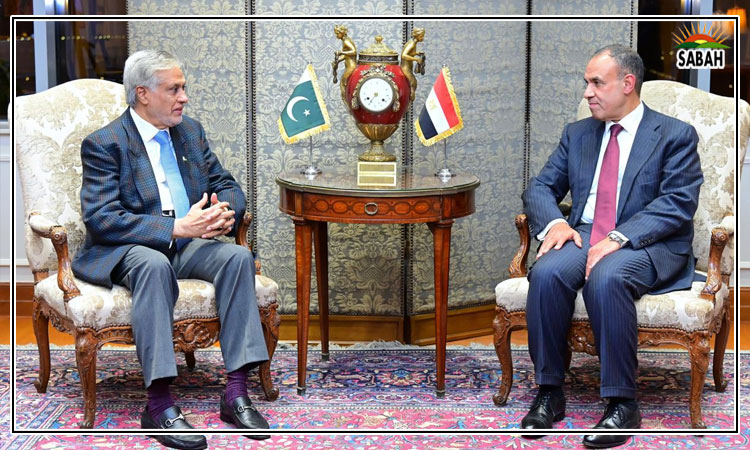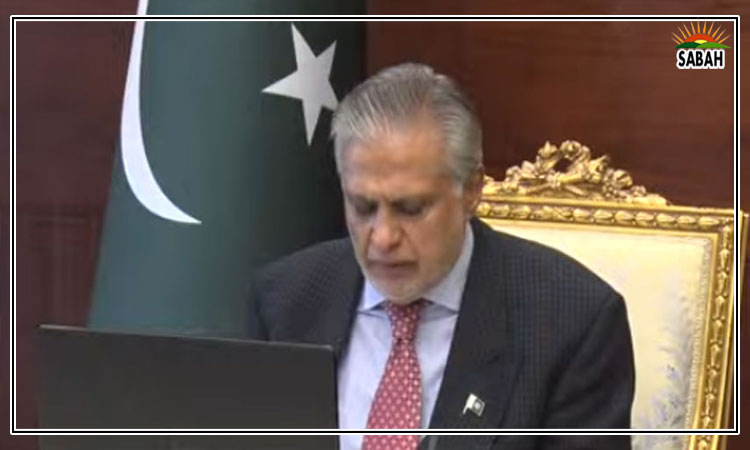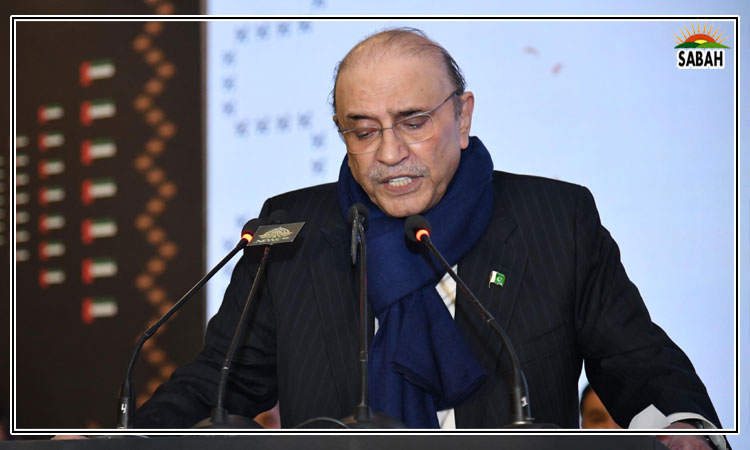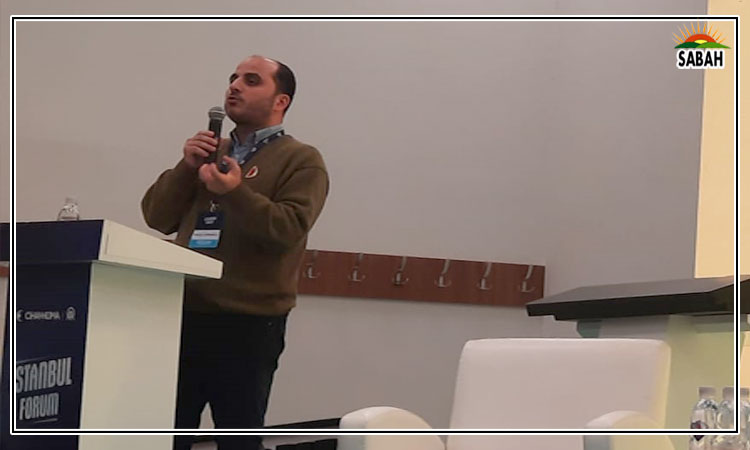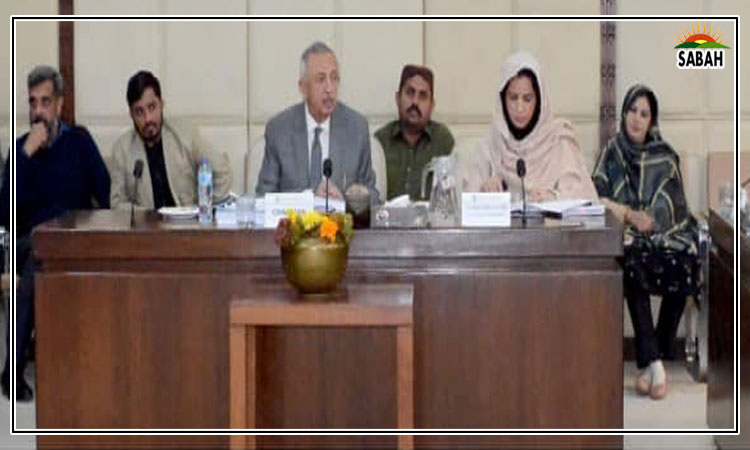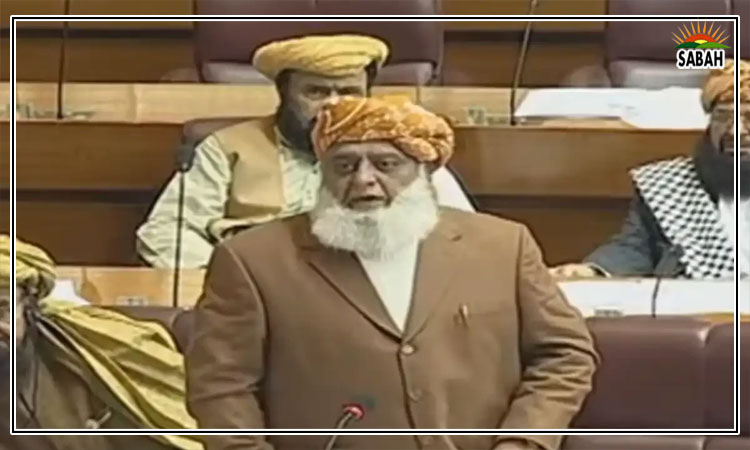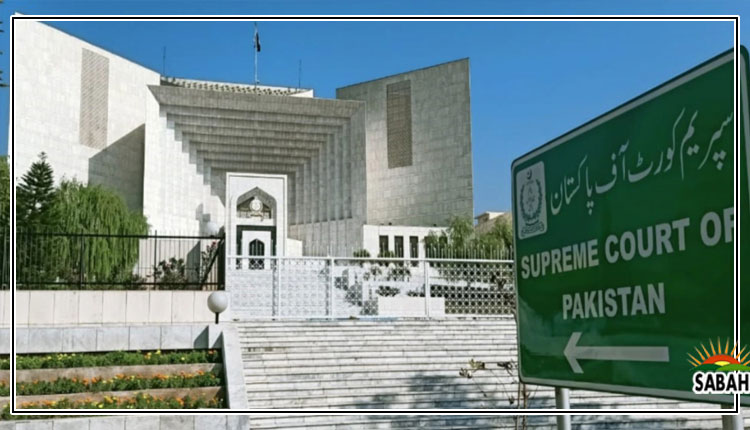Supreme Court of Pakistan directs AGP Mansoor Usman Awan to submit record of NA proceedings on SC bill by tomorrow
ISLAMABAD, May 08 (SABAH): The Supreme Court of Pakistan on Monday directed the Attorney General for Pakistan (AGP) Mansoor Usman Awan to submit the record of National Assembly’s proceedings on the judicial reforms by tomorrow (Tuesday).
The direction from an eight-member larger bench came on Monday during a hearing of the pleas challenging the Supreme Court (Practice and Procedure) Bill 2023.
An eight-member larger bench of the apex court headed by Chief Justice of Pakistan (CJP) Justice Umar Ata Bandial and comprising Justice Ijazul Ahsan, Justice Munib Akhtar, Justice Sayyed Mazahar Ali Akbar Naqvi, Justice Muhammad Ali Mazhar, Justice Ms. Ayesha A Malik, Justice Syed Hasan Azhar Rizvi and Justice Shahid Waheed, was hearing the pleas.
The bench grilled Attorney General of Pakistan Mansoor Usman Awan over the government’s plea to form a full court to hear a set of petitions against a law aimed at limiting the powers of the chief justice of Pakistan (CJP).
At the outset of Monday’s hearing, AGP Awan informed the court that a plea had been filed for the formation of a full court to hear the case. “The PML-N has also filed a petition for the formation of a full court,” he said.
Justice Ahsan noted that the government’s plea had not yet been fixed for hearing. He then asked the AGP whether the documents sought by the court at the previous hearing had been submitted.
Awan replied that he expected to receive the record of parliamentary proceedings by tomorrow and had also contacted the NA speaker in this regard.
“The judiciary’s independence is a fundamental element of the Constitution,” the AGP added. He said that the law in question had set out the procedure for constituting benches as well as dealing with appeals.
“The matters decided in the law are administrative in nature,” he said, arguing that the SC’s rules were formulated by a full court.
He said that decisions and cases concerning the judiciary’s independence and rules should involve a full court, adding that the law would also be applicable on judges that were not hearing the case.
Justice Ahsan, however, said that the matter at hand concerned the power to legislate and not changes to the SC rules. “Various benches have been routinely hearing cases relating to legislative powers,” he said.
At this point, Justice Naqvi asked if such a law had been enacted in the past. The AGP responded by saying that the president’s permission was required for making rules until 1973.
Justice Naqvi then asked how such a law could be passed when Article 191 of the Constitution was present.
Article 191 states the following: “Subject to the Constitution and law, the SC may make rules regulating the practice and procedure of the court.”
The AGP contended that such a case had not been filed in the past and, therefore, a full court should be constituted.
“Many cases are the first of their kind. Any of the Supreme Court’s benches can hear any case,” Justice Malik said. She also questioned whether the government wanted to avail the “advantage” of a full court.
She then questioned whether the government wanted the top court’s internal discussions to come out in the open. “Every case is important. How can it be determined whether a full court should hear a [particular] case? Did a full court hear every case related to the judiciary’s independence?” she asked.
She also asked whether the AGP was trying to say that the nation had demanded a full court. “How can the court regulate proceedings at the whims of the petitioner?” she questioned.
The AGP conceded that a full court had not heard every case related to the judiciary’s independence but highlighted that several cases, including the Iftikhar Muhammad Chaudhry case, were heard by a full court.
“The Iftikhar Chaudhry case was of a different nature,” Justice Naqvi said.
Justice Akhtar then stated that the full court had the power to formulate rules for administrative matters. “If a case concerning the [SC] rules comes up before a three-member bench, should that also be heard by a full court?” he asked.
Justice Malik went on to state that the AGP’s argument was “beyond comprehension” as it indicated that a decision made by a full court was good and one made by a three-member bench was bad.
Justice Ahsan then asked whether the AGP was trying to say that since a full court constituted these rules then it should also interpret them. He observed that under the new law, a five-member bench would hear cases concerning the Constitution’s interpretation.
The AGP stated that the top court had barred the government from implementing the law.
“Parliament says there should be a five-member bench [whereas] the attorney general says there should be a full court. It seems that the government’s [ability to] count has weakened,” Justice Akhtar remarked. “If Parliament is satisfied with five judges, why isn’t the attorney general?” he asked.
Justice Ahsan then observed that the respective high courts would be bound to constitute a full court if the top court issued an order. “If the provincial assembly passes a rule of this nature, will the entire high court hear the case?” he asked.
The AGP, referring to a past case, said, “Zulfikar Ali Bhutto objected on the bench in his case. There was an objection to the judges and a nine-member full court heard the case.”
“Then chief justice Anwarul Haq dismissed the objection. The chief justice himself was also included in the nine-member full court. In the present petition, there is no objection on any judge or chief justice,” he said.
Here, the CJP observed, “If there is an objection, the judge has to decide if he wants to hear the case or not.”
CJP Bandial then remarked, “In the future, have to ascertain under what circumstances can the bench say to constitute a full court. The court needs further assistance on this.”
The AGP said that the matter did not only concern the interpretation of the Constitution. He said that the SC had upheld the establishment of military courts in the country.
The CJP observed that the case at hand did not concern a constitutional amendment.
However, AGP Awan said that the court’s decision were meant for the future. “Perhaps after 20 years, the ground realities and the Constitution may be different,” he said as he wrapped up his arguments for the formation of a full court to hear the case.
At this point, the CJP asked whether the PML-N’s plea for the formation of a full court had been fixed for hearing. The party’s lawyer, Barrister Salahuddin Ahmed, said that the plea was submitted today and had been fixed.
The PML-N’s lawyer argued that the implementation of a law had been barred by the court for the very first time. He further said that pleas were routinely filed for the formation of a full court, adding that a full court was constituted to hear the Justice Qazi Faez Isa case.
Justice Ahsan said that the case concerning Justice Isa was sent to the CJP, adding that the top judge himself did not hear the case.
The CJP then remarked that the Iftikhar Chaudhry and Justice Isa cases were based on presidential references. The SC is on trial when allegations are made against judges. A full court was constituted due to its serious nature,“ he said.
Justice Akhtar then said that the law made by Parliament talked about a five-member bench hearing the case. “How can the PML-N file a plea for the petition of a full court?” he asked.
In its application, the PML-N has submitted that in addition to being a matter of great significance for a number of reasons, “it is also the first time in the history of Pakistan that an Act of Parliament has been restrained through interim order from coming into effect”.
“To lastingly settle the law in relation to these complex issues, the collective wisdom of all the judges of this Court is necessary,” the petition argued.
AGP Awan further argued that “matters concerning judicial independence and rules should be heard by the full court”.
“The rules of the SC were created by the full court and they can be amended also by a full court,” he stressed.
Justice Ijazul Ahsan however remarked that “the question is of legislative powers, not of amending the rules.
“Cases concerning legislative powers are heard routinely by various benches,” he said
Justice Ayesha Malik remarked that “many cases are first of their kind”, implying that this was not reason enough to constitute a full bench.
“Does the government wish to take advantage of the full court? Does the government want the internal disagreements of the court to come out?” she questioned, noting that “every case is important. Who is to decide which one of those should be heard by a full court and which ones should not?”
She then went on to question whether “every case of judicial independence was heard by a full court”, to which the AGP responded in the negative but began to argue through the example of Justice Iftikhar Chaudhry case.
This attempt was shot down by Justice Mazahar Naqvi who said that that case was of a different nature.
“Are you trying to say that the people have faith in the full court?” said Justice Malik, “How could the court regulate its proceedings on the wishes of the petitioner?”
Justice Muneeb Akhtar also observed that the full court only has the power to make rules in administrative matters. “If a case concerning the interpretation of rules comes before a three-judge bench, should it also be heard by the full court?” he retorted.
AGP Awan said that in the present case, the legislative authority is being challenged.
Justice Malik said that your logic is incomprehensible, the decision of the full court will be good and the decision of the 3-member bench will be bad.
At one point, CJP Bandial asked the AGP if he had submitted a parliamentary record of the Supreme Court (Practice and Procedure Bill) 2023. To this, the court was informed that the record of the parliamentary proceedings is expected by available by tomorrow as Speaker’s office has been contacted both formally and informally.
Presenting the PML-N’s case, Barrister Salahuddin Ahmed said that the rules of the SC do not structure the power of the CJ to form a bench. He also objected to the bench’s constitution in the present case.
Meanwhile, Justice Ahsan remarked that “you want the court to decide which cases will be heard by which bench. If you open this Pandora’s box, full court requests will flood the courts.”
Later, after hearing the arguments, CJ Bandial ordered AGP Awan to provide the records of the proceedings of the parliament and the Standing Committee and postponed further hearings of the judicial reforms bill for three weeks. Chief justice said that one of the judge including in the bench will not be available for next three weeks.
Meanwhile, PTI’s Fawad Ahmed Chaudhry — who attended Monday’s hearing — said that the government was constantly switching its position regarding the case. “The government has a different position in Parliament and the media than the one before the SC,” he said while speaking to reporters outside the apex court.
He said that media reports in the morning suggested that the government had refused to provide the record of parliamentary proceedings yet the AGP told the SC today that the record would be provided by tomorrow.
“You should take one position be it whichever one you want. We would definitely want that you take a position that is in accordance with the law and Constitution,” Fawad said.
Earlier on Monday, the PML-N filed a petition seeking the formation of a full court bench to hear the petitions against the law aimed at curbing the CJP’s powers.
The plea urged the apex court to constitute a full court as “the matter is of great constitutional import and the issues involved are of first impression”.
It said that the “legislative right and domain exercised by the chosen representatives of the people” was on one side while the “need to protect the independence of judiciary” lay on the other.
The petition noted that Articles 175(2) (establishment and jurisdiction of courts) and 191 (rules of procedure) of the Constitution and Entry 55 of the Federal Legislative List were “yet to be judicially interpreted in this context”.
The PML-N’s plea further said that the “collective wisdom of all the judges of this court is necessary” since it is the “first time in the history of Pakistan that an act of Parliament has been restrained through [an] interim order from coming into effect”.
Moreover, the petition says it would “not at all be appropriate for the matter to be heard by an eight-member bench that is both selected (and headed)” by the CJP as the act “involves devolving and sharing the discretionary powers of the CJP himself”.


